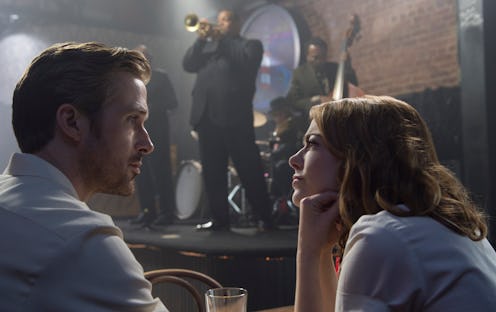
The Academy Awards will be handed out on Sunday, Dec. 26. And though 2016 was a banner year for the art of filmmaking, the Best Picture race already appears to be all but wrapped up. The musical romance La La Land has been wiping the floor with its competition at most other award shows, picking up the highest honors offered by the Golden Globes, the BAFTAs, the Critics' Choice Awards, and several regional critics associations. At the same time, there's a cultural backlash that insists that the Emma Stone and Ryan Gosling film isn't deserving of all the hype and in some ways, actually epitomizes what's wrong with the industry and its whole recognition apparatus. The controversy and the success both beg the question: why is La La Land winning all of these awards?
The Damien Chazelle film reimagines smoggy, cynical Los Angeles as a place where starry-eyed hopefuls use its murderous traffic as an opportunity to stage a dance number and where old Hollywood inspiration lies around every corner for those — like Mia and Sebastian — who are clever and soulful enough to look. It's a movie about the drive to touch people with your art more than it is a love story. Mia wants to rise about the cattle calls to prove herself a storyteller. Sebastian wants to put his mark on an art form that, to him, is almost dead. (I'll get to the issues with that.) My point is that La La Land is about the very people the members of many of these voting bodies imagine themselves to be or to once have been. Hollywood loves to fawn over movies that reflect itself. It's why The Artist beat out Moneyball for Best Picture and Birdman bested Boyhood.
I should add here that I enjoyed La La Land immensely. It's a gorgeous homage to the great movie musicals of the past; Gosling and Stone are both swoon-worthy; and I left the theater humming those simple, lovely songs. But I also recognize that La La Land is the "safe" choice for a voter. It's not challenging like Elle or groundbreaking like Moonlight. It's a nice story occupied by gorgeous actors, and it tells industry folks exactly what they want to hear: that what they do is vital, romantic, and a worthy calling.
With movies like Hidden Figures, Fences, Lion, and again, Moonlight all in the field, it's especially glaring that La La Land is overwhelmingly white. The movie has been criticized for Sebastian's designs on "saving" jazz, a style of music pioneered by African-Americans. The only main non-white character is Keith (John Legend), a musician who's portrayed as a "sell-out" and who lures Seb into temporarily abandoning his "pure" artistic aspirations. If La La Land does win the big award come Sunday, expect its treatment of race to continue to be a part of the conversation.
Another major factor in the awards game is the question of who has seen what? It's impossible for voters to see all eligible movies, so the movies that have stronger marketing campaigns have a better chance of getting plucked out of the screener pile. La La Land has that necessary momentum going into the Oscars, which could keep it in the front of the pack.
The Oscars and other award ceremonies like it can never be purely objective. They're statements of taste, preference, cultural and political climate, and good old fashioned business sense. La La Land is a finely crafted movie, but if it wins, that won't be the only reason why.